Improving Early Childhood Outcomes and Systems for Families Affected by Parental Substance Use, Substance Use Disorders, and Co-Occurring Mental Health Disorders
Helps build capacity for child welfare, substance use disorder (SUD) and mental health treatment, and early childhood service providers—as well as other family-serving agencies. The series is for agency leaders seeking to improve outcomes during the early childhood period for families affected by SUDs. The series includes fact sheets and discussion questions with embedded videos that feature subject matter experts including parents in recovery from SUDs. The videos are available.
Overview: Improving Early Childhood Outcomes and Systems for Families Affected by Parental Substance Use, Substance Use Disorder...
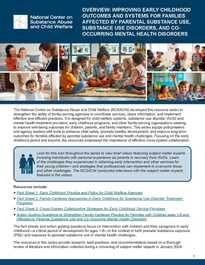
National Center on Substance Abuse and Child Welfare, 2025
Introduces the series and includes a brief video of a subject matter expert sharing...(Read More)Fact Sheet 1: Early Childhood Practice and Policy for Child Welfare Agencies
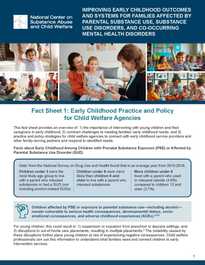
National Center on Substance Abuse and Child Welfare, 2025
Provides an overview of common challenges to meet the needs of families affected by...(Read More)Fact Sheet 2: Family-Centered Approaches in Early Childhood for Substance Use Disorder (SUD) Treatment Programs
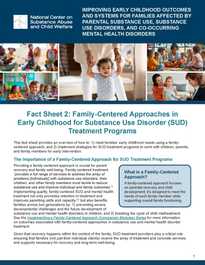
National Center on Substance Abuse and Child Welfare, 2025
Provides an overview of how a family-centered approach can be used to improve...(Read More)Fact Sheet 3: Cross-System Collaborative Strategies for Early Childhood Service Providers
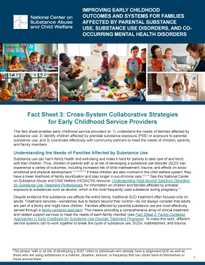
National Center on Substance Abuse and Child Welfare, 2025
Intends to help early childhood service providers to: 1) understand the needs of...(Read More)Action Guiding Questions to Strengthen Family-Centered Practice for Families with Children ages 1-6 and Affected by Parental Sub...
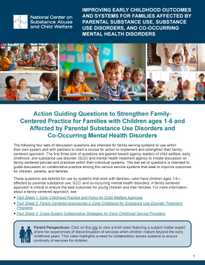
National Center on Substance Abuse and Child Welfare, 2025
Includes four sets of discussion questions intended for family-serving systems to...(Read More)